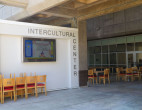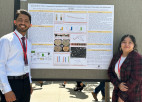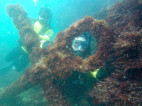Second of two parts. Read Part 1 [here].

Amber Raskin is SCVi’s executive director.
Santa Clarita Valley International Charter school, or SCVi for short, a Hart district-authorized K-12 public charter school opened in 2008, offers tours of its unique campus in a Castaic shopping center each Thursday, usually guided by high-school-age student ambassadors.
On this day, the visitor’s tour guide was Amber Raskin, SCVi’s co-founder and executive director of business development and operations. Along the way, we got to see the campus layout and talk with students from age 9 to 17, and a parent of three SCVi students in three different grades.
On the ground floor of the two-story, 33,545-square-foot main building, we observed groups or “communities” of kids in similar age groups and grades in areas separated by low partitions that maintained an open-space floor plan. Some of the kids worked in groups, or pairs, or solo, usually reading or working on a computer tablet; others interacted with the teachers/facilitators for their respective grade levels.
As one might expect, SCVi’s ground floor was a bit noisy, but there was an energetic enthusiasm among the kids, who hardly minded the din. They were too engrossed in the things they were doing to notice.
Raskin pointed to that as an example of how SCVi students get a taste of the real world right from the start.
“In today’s environment, in the workplace, your first job isn’t at home, you don’t get a corner office where it’s quiet, so you have to learn to acclimate to this kind of situation,” she said. “You have to learn to work together, to negotiate, share and collaborate. That’s a 21st Century skill. We often find that things are split here, that you do your quiet work at home. So if you don’t get something done at school, the math you didn’t finish in class becomes your homework. But if you sit here all day in every class, you’d see there’s some quiet time and some less quiet time. You saw some of them just reading in that one classroom.”
We walked to another area of the floor and paused for a moment to take in the panorama and the organized chaos.
In different areas, there were multiple classrooms of kindergarten and first-grade students, second- through fourth-grade students, and fifth- and sixth-graders, each age group with up to six teachers or facilitators.
“It gives (students) the flexibility with six instructors to be able to switch around groups if they need to,” Raskin said. “If they want to do ability grouping or if they want to work on a certain skill, they have the flexibility with all the extra adults to do that.”
Multi-age grouping is a core element of SCVi’s approach, Raskin said. “Any teacher will tell you that if you have 25 or 30 kids, all the same age, they’re all at different levels. So by intentionally blurring lines, we look at kids at what developmental stage they are, rather than assume (because) they’re this age, this month, they should be at this skill. We ask, ‘Where are you now? We need to teach you where to go from here, wherever you are,’ instead of saying, ‘You need to be here…’ One size does not fit all.”
In the classroom area of Matt Watson, an Explorers teacher who also teaches sports and fifth-grade community, we spoke with Abby Blasberg, a 9-year-old fifth-grader — who had been reading and relaxing, barefoot – about what she likes most about SCVi.
“I like how it’s a project-based school, so there is a bunch of stuff to do after school,” she said. “We do a lot of projects. It’s fun.”

Fourth-grader Abigail Blasberg reads with her teacher, Mr. Watson, as classmates (from left) Jack Vest, Ryan Niederhauser, Austin Inglis and Magnus Rodriguez-Peye read by themselves.
Blasberg said her most recent class project was about land forms. “We made a model of land mass we made up, and there were a bunch of different regions and land forms, and we would explain them,” she said. “Right now we’re learning about how to put people on there, and what they would eat. Like, if we were Native American people that lived in a region we picked for the project, we’re going to pretend we came back to the future in 2012 to explain to everybody what it was like back then, and how the Native Americans lived.”
Blasberg thinks the school’s mash-up of grades is cool. “You can make friends with older people in older grades, ’cause this is a fourth- and fifth-grade classroom, so when the fifth grades go up to sixth grade, you can hang out with them more when the fourth-graders are fifth-grade, and then you can meet the sixth-grade friends and their sixth-grade friends,” she said. “Like, sometimes if you need with division or something, you can go ask a fifth-grader or another fourth-grader to help.”
On the building’s second floor, the middle school and high school wings look more like traditional classrooms, but instead of rows of desks, there are tables that seat five or six students each, and other furniture is arranged in other creative ways.
Another big difference between SCVi and traditional schools is the presence of electronic devices like tablets and especially smartphones. Tablets of all kinds and platforms are in use by some students in the elementary grades, but electronic tools are ubiquitous in the middle school and high school classes.
In one middle school science class, Grace Stockton (13), Ashley Gaudenti (13) and Stevie Sanborn (12) sat at a round table, each working with an electronic device, reading or doing research online.
“There’s an iPad, a laptop and a phone,” Raskin said, noting the girls’ tech array. “I think the iPad is owned by the student, this is a school laptop, and that’s her phone. We allow students to use these tools. Phones are banned in a lot of schools, but we see them as tools. And do they use them inappropriately? Yeah, sometimes. So then we have a conversation and teach them. The idea is not to punish the behavior, but to teach them.”
It was a science class, and the girls were reading novels with a scientific element to them. “We have different novel groups,” said Sanborn. “I’m in ‘Dracula,’ and she’s in ‘2001: A Space Odyssey,’” she said, referring to a fellow eighth-grader nearby, Joanne Brimigion, 13. “I like (“2001”) because it’s very futuristic and the computer takes over the ship,” Brimigion said.
“I feel like we aren’t trapped in a jail,” Sanborn said, explaining why she liked attending SCVi. “At other schools, everyone has to be silent and read books, and you can’t talk, you can’t have your phones out. But here, it’s really free and I feel like you’re trusted more, and I feel more comfortable.”
In a traditional school, Brimgion said, “You have to do it exactly how they want you to, so you couldn’t have freedom to be creative. But here, you’re given a project and you can take it wherever you want.”
Added Sanborn: “Instead of having to search through a book, a hundred pages and then you miss a page, you have to back and find it again, and then the book closes because of the wind or something, you’re allowed to go on your iPad or other technology devices and you can just find it. You’re allowed to go onto the ‘Interweb’ and find stuff through there or you’re allowed to read your book on my phone, like I am, on an app.”
Sanborn said she wants to teach when she grows up. “Ever since I was little I wanted to be an English teacher because I have this weird obsession with English and writing. But since it’s not very (well-) paying, I thought that during the summer, in my free time, I would write, and once I publish a book I’d be able to just keep going along with that.”
“I want to be pediatric orthodontist or an anesthesiologist,” Brimigion said, “because one, it pays a lot, and two, I’ve always been interested in being an orthodontist. I don’t know why, I just like it. I know I’m going to be in school for a long time and have to have really good grades in math and science in order to pursue that career.”
Speaking of tablets and iPads, there’s no PC-vs.-Mac conflict at SCVi. “We don’t have only one platform. We have Windows and Mac, and use open source-software,“ Raskin said. “We do that on purpose because it’s important to know there are many different ways to attack problems. We do that in so many things – in teaching multiple languages, teaching multiple computer platforms — and we do it when we teach kids to get along with each other.”
SCVI’s IT director for two years now, Shannon Berrigan, is a Saugus mom with three youngsters at the school in third, sixth and ninth grades. The self-described “tech chick” likes SCVi’s individualized learning.
“Each of my kids can learn at their own level the way they learn best,” she said. “Each responds differently. My third-grader absolutely loves it; she needs to be active and hands-on and she needs the project-based learning. My sixth-grader is a little more reserved, a bit quieter and deeper. He also does great at it, but his projects are different – and it’s OK, he still can do project-based learning, but his projects are a little more traditional. My high-schooler, I think… it took her longer to come around, longer to embrace it. I think she’s still coming around. I think this year she’s enjoying it more.”
Berrigan said her kids were in a traditional local school before SCVi, but she wanted a different experience for them. “They were doing great. We were at a great school, had great relationships. I just wanted them to love learning, and I don’t think they were loving learning,” she said. “I wanted them to have fun (while they learned). I wanted them to be happy, without emotional strain. I wanted that family environment. So, this is what we were looking for.”

SCVi high-schoolers Paige Guarino and Sydney Hild work on their presidential “POL.”
On the other side of the second floor, in the high school wing, 10th-graders Paige Guarino, 14 1/2, and Sydney Hild, 15, both “student ambassadors” who help conduct regular Thursday tours for prospective parents and students, offered their perspective on how SCVi differs from the traditional school model.
“You do a lot more project work here, and you’re more connected with it, and you make more of a relationship with your work so you use it in modern-day life, rather than just writing a test, taking it and moving on to something else,” Hild said. She added she’d like to work with animals as a career. “I want to get a zoology degree and own my own ranch with lots of different animals on it.”
Guarino thinks the SCVi model prepares students better for college. “It gives you a grasp of not only how to work with the school system, but also how to see your weaknesses and your own strengths, so that you may use them as you go on to college and into the work force,” she said.
Guarino is applying for a scholarship to Pepperdine University to study political science and law. “I want to get into the more political side,” she said.
It happened to be the day before the Nov. 6 general election, and Hild and Guarino were taking a break in finalizing what the school calls a “presentation of learning,” or POL in campus lingo, related to the national contest.
“A POL is when we go as a group and present all of our work,” Guarino said. “We present a project or something we’ve learned and spent a lot of time perfecting and trying to see the different sides of. And then we can show it not only to our peers, but also to the grades below us so they can learn, and our parents, so they can be involved in our learning.”
For this project, the students took a novel approach to learning about the presidential race, one that coincidentally avoided all the distracting partisan rhetoric and tumult of the real race.
“We each (invented) our own presidential candidate in a fictional SCVi race,” Hild said. “We had to create a person that didn’t exist, to come up with their life story and everything. We had to look at all the steps they took to run for president, look up all the facts.”
The students’ candidates had to be ready to debate the state initiatives, too. “We also had to go through and see all of the props,” Guarino said. “He has to have his opinion on everything — he needs to know where he stands.”
“So tomorrow, every student in our group has their own candidate, and the people who come and visit will be able to vote on who they like out of our group of presidential candidates,” Hild said.
It’s an example of a cross-discipline project that focuses on English and history, but also involves current events, politics, math (statistics), social studies (as in, voter demographics), and even public speaking.“We like to see inter-disciplinary and joint projects, shared projects like this, whenever possible,” Raskin said.
Walking down another hallway, we heard rock music blasting from speakers in one room, where Tim Waller and Rudy Ortiz were playing bass and drums live along with a recording. The players took five so Waller could talk with us.
“Our history teacher, Mr. Salzarulo, is the music guy here, and that’s his classroom,” said Waller, 17, an 11th grader. “He already had instruments in there and was talking about bringing in a drum set. So I brought in my drums, my friend Will brought in this five-string bass. And now at lunch if we have nothing else to do, we play music and it’s fun. We just recently learned how to get music to play with speakers out of my iPod. Now we can play along to songs, and I can help teach everyone how to play.”
Waller, who attended five or six different schools, public and charter, in California and Arizona, is in his second year at SCVi, and in the highest-level math and science classes. He maintains a 3.5 GPA and tutors other students as his last class Tuesdays and Thursdays.
“I’m very into science,” Waller said. “When I graduate, I’m considering biochemistry, chemistry in general, chemical engineering or something medicinal, like pharmaceuticals. I really like UCSB and UC schools, but I also know that they’re extremely expensive, so it’s kind of anywhere I can get into.”
Preparing students for college and the real world have been at the core of SCVi’s approach to teaching and learning since Raskin co-founded the school in 2008.
“I was a mom looking for something,” she said. “I came from entertainment, and school didn’t make me thrive, necessarily, when I was school. And even though I got a college degree, I felt like what was valued in the traditional system and in the workplace were different. And I was looking for an environment that would help my kids thrive in learning, and love learning and find their passion for life and make a difference in the world in something they enjoy with their life.”
Rather than homeschooling her kids or enrolling them in private schools, Raskin opted to create SCVi.
“I decided to put the money into creating a place where all kids could go,” she said. “because I thought that would be modeling, for my own children and the children here, what’s important in life – which is to make a difference and do something meaningful.”
For more information about SCVi, visit the school’s website at www.scvcharterschool.org and check out SCVi’s YouTube channel.
“You can read about how and why we do what we do in the ‘About Us’ section,” she said. “ And you can apply to get your kids on the list to go into the lottery, which happens in March. It’s all electronic. On the Admissions page, it talks a lot about how to do that. And you can take a look at the schools that were models for SCVi. There’s also a place to apply for jobs.”
Raskin said SCVi is the only school of its kind in the Santa Clarita Valley. “At least right now, but we’re not the only one in the country. There are a lot of other project-based schools. It’s definitely the way of the future.”
Like this:
Like Loading...
Related




 Tweet This
Tweet This Facebook
Facebook Digg This
Digg This Bookmark
Bookmark Stumble
Stumble RSS
RSS































REAL NAMES ONLY: All posters must use their real individual or business name. This applies equally to Twitter account holders who use a nickname.
No Comments